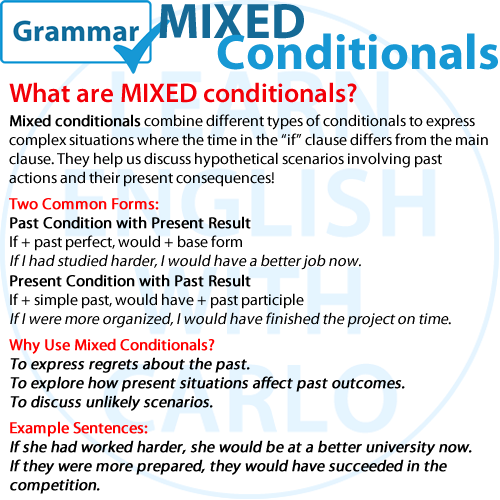Understanding Mixed Conditionals
Mixed Conditionals are a combination of two different types of conditionals, typically mixing the second and third conditionals. They are used to express situations where the time in the “if” clause is different from the time in the main clause. This allows for a more nuanced expression of hypothetical situations that may involve past actions and present consequences or vice versa.
What Are Mixed Conditionals?
Mixed conditionals allow speakers to convey complex relationships between conditions and results that are not strictly tied to a single timeframe. Here are the most common forms of mixed conditionals:
- Past Condition with Present Result
- This structure expresses a hypothetical past situation and its present consequence.
- Form: If + past perfect, would + base form of the verb
- Example: If I had studied harder, I would have a better job now.
- Explanation: The speaker didn’t study hard in the past, and as a result, they have a lesser job in the present.
- Present Condition with Past Result
- This structure reflects a present situation that results in a hypothetical past consequence.
- Form: If + simple past, would have + past participle
- Example: If I were more organized, I would have finished the project on time.
- Explanation: The speaker is not organized in the present, which resulted in not finishing the project on time in the past.
Usage of Mixed Conditionals
Mixed conditionals are particularly useful when you want to explore complex ideas about regret, consequences, and the interplay between different timeframes. Here are some situations where mixed conditionals can be effectively used:
- Expressing Regret About the Past:
To show how a past action affects the present.- If I had taken that job offer, I would be living in New York now.
- Hypothetical Present Affecting the Past:
To illustrate how a current state could have changed a past outcome.- If he were more attentive, he wouldn’t have missed the deadline last week.
- Discussing Unlikely Scenarios:
To express unlikely present conditions leading to past outcomes.- If I had known you were in town, I would have invited you to the party.
Example Sentences
- If she had worked harder in school (past), she would be at a better university now (present).
- If they were better prepared (present), they would have succeeded in the competition (past).
- If I had learned Spanish (past), I could communicate better with my friends now (present).
Conclusion
Mixed conditionals provide a versatile way to express complex hypothetical situations where the timing of actions and their consequences differ. Understanding how to use mixed conditionals can enhance your fluency in English, allowing for more sophisticated expressions of regret, possibilities, and hypothetical scenarios.

FAQs About Mixed Conditionals
1. What are mixed conditionals?
Mixed conditionals combine different conditional forms to express relationships between past actions and present consequences or vice versa.
2. How do I know when to use a mixed conditional?
Use mixed conditionals when discussing situations where the time in the “if” clause differs from the time in the main clause, especially to express regrets or unlikely scenarios.
3. Can I use “could” instead of “would” in mixed conditionals?
Yes! You can use “could” to express a possibility or ability:
- If I had known about the meeting, I could have prepared better.
